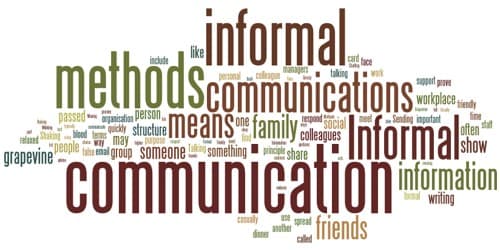Usefulness and Importance of Informal Communication
Informal communication does not follow the established rule, regulations, and chain of command. In spite of this, informal communication has already proven its utility in performing organizational activities. In the modern communication system, this communication is found to be used in a mutual supplementary way with the formal communication system. Moreover, it helps to overcome the shortcomings of formal communication. Therefore, it is regarded as a substitute for formal communication. In the following, we are discussing the importance or advantages of informal communication:
- The alternative to formal communication:
Informal communication is regarded as an alternative to formal communication. Informal channels convey those messages that cannot be transmitted through formal channels. In order to complete any formal communication, informal communication and grapevine communication provides a huge boost to organizational employees. It reveals that informal communication channels reduce the lack of formal communication and thus increases the effectiveness of the whole communication system in the organization.
- Providing interpretation of the message:
Sometimes messages that come through formal channels require interpretation and clarification. Informal communication greatly helps in providing the necessary clarification and explanation of those messages. It enables management to know what the subordinates think about the organization and its various activities.
- Organizational Solidarity:
The existence of informal communication proves that the workers are interested in their association. The important fact is that they talk among themselves and help to promote organizational solidarity. If properly used, it may raise the morale of the workers.
- Improving interpersonal relationships:
Informal communication is the means of exchanging personal feelings, opinions, likings, and disliking of the employees. This communication is very much helpful to create intimacy. Through this communication, they can come close to each other. Communicators and communicatee come closer to each other to express their views. Thus, informal communication helps to develop and maintain good relations among the people in the organization.
- Transmitting messages quickly:
Informal communication channels are useful in disseminating information very quickly. The speed at which informal communication is transmitted is just remarkable. Therefore, when it is needed to spread a message within a short period of time, we can take the help of an informal communication channel. Just select a leader and give him some information, cleverly describing it as ‘Top Secret’, and within minutes, it will spread like wildfire to all.
- Spontaneous Attitude:
People involved with informal communication do not hesitate to exchange views and ideas as there is no pressure on all. Employees can put forward their various complaints and superiors can give prompt solutions accordingly. They have an open mind to share information with a positive attitude. This helps a lot in creating a congenial working and communication environment.
- Flexibility:
Informal communication is flexible in nature, as it does not follow any prescribed rule and formality. It opens the door for mutual communication between superiors and subordinates. Here information can flow in any direction and can spread quickly. Therefore, subordinates feel free to interact frankly which can influence their efficiency. It is free from any pressure and hazard. This helps the sender and receiver to resolve their respective problem mutually.















